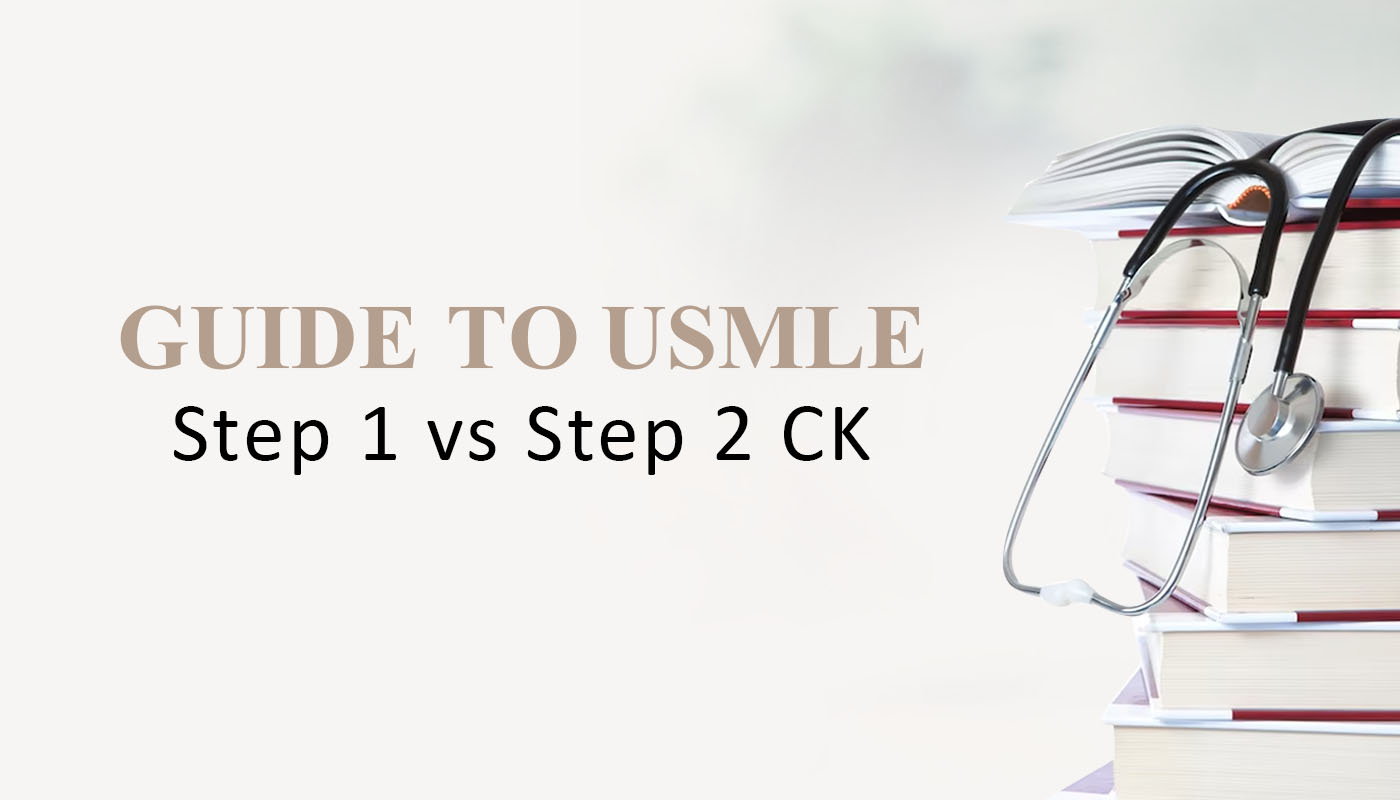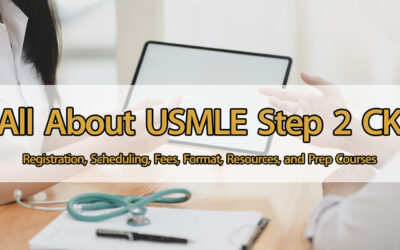Step 1 and Step 2 CK (Clinical Knowledge) are the cornerstone exams in the USMLE series. They test a candidate’s medical knowledge and application skills and are critical in determining their path toward residency and specialization. While both steps are integral to the USMLE, they differ significantly in content focus, structure, and the skills they aim to assess. Step 1 emphasizes applying fundamental science concepts in medical practice, covering various topics from anatomy to biochemistry. In contrast, Step 2 CK focuses on clinical knowledge and patient care, assessing the ability to diagnose and manage diseases.
Understanding the nuances, challenges, and preparation strategies for these steps is essential for medical students aiming to succeed in the USMLE. The following sections delve into a detailed comparison of USMLE Step 1 and Step 2 CK, exploring their differences, similarities, and the strategic approaches required for excelling in these crucial exams.
Table of Contents
- Knowledge Needed for Step 1 vs Step 2
- Test Scoring Differences Between USMLE Step 1 and Step 2
- USMLE Step 1 vs. Step 2 Difficulty
- Similarities Between Step 1 and Step 2
- When to Take Step 1 and Step 2
- Importance of Step 1 vs Step 2 for Medical Students and Residencies
- Prepare for the USMLE With High Scores Using GoldUSMLEReview
Knowledge Needed Step 1 vs Step 2
The USMLE Step 1 and Step 2 are critical in assessing a medical student’s readiness for obtaining a medical license in the United States. These exams evaluate different facets of medical knowledge, ensuring a comprehensive understanding of both theoretical and practical aspects of medicine.
Skills Tested for USMLE Step 1
Regarded by many as the most crucial of the exams, USMLE Step 1 focuses intensely on the basic sciences. This test is about understanding core concepts and memorizing and integrating a vast array of facts. It requires a deep and thorough knowledge of pathology, physiology, pharmacology, biochemistry, microbiology, and anatomy.
Preparation for Step 1 should involve an extensive review of these subjects, emphasizing the breadth and depth of knowledge. Students are advised to engage in rigorous self-testing, using question banks to cover a wide range of topics and to assess their understanding and recall of each area.
Test Scoring Differences Between USMLE Step 1 and Step 2
When preparing for the United States Medical Licensing Examination (USMLE), understanding the scoring differences between Step 1 and Step 2 is crucial for effective study planning. These steps, integral to the same exam series, have distinct scoring methodologies and implications for residency matching.
USMLE Step 1: Transition to Pass/Fail
A significant change in the scoring of USMLE Step 1 came into effect on January 1, 2022. Previously scored numerically, Step 1 has transitioned to a pass/fail structure. This shift aims to reduce the overemphasis on test scores during the residency selection, fostering a more holistic approach. However, it’s important to note that for residency programs, the USMLE Step 1 score, even as a pass/fail metric, remains a pivotal component in evaluating applicants.
USMLE Step 2 CK: Continuation of Numerical Scoring
In contrast, USMLE Step 2 Clinical Knowledge (CK) continues to use a numerical scoring system. This step is known for its emphasis on clinical knowledge and decision-making skills vital for patient care. The minimum passing score for Step 2 CK has been set at 209, with the understanding that higher scores correlate with better residency match prospects.
Specialty-Specific Scoring Trends
Scores for both exams can vary significantly based on the chosen medical specialty. For instance, neurology residents in the 2020-21 academic year achieved an average Step 1 score of 229.5 (standard deviation of 17.1) and an average Step 2 CK score of 239.4 (standard deviation of 15.4). These figures highlight the competitive nature of scores within specific specialties.
Implications for Aspiring Neurologists
Aspiring neurologists should score around or above 230 on Step 1 and 240 on Step 2 CK to remain competitive. This benchmark is crucial for those aiming to match into neurology residency programs, known for their rigorous selection criteria.
Preparation for Step 1 should involve an extensive review of these subjects, emphasizing the breadth and depth of knowledge. Students are advised to engage in rigorous self-testing, using question banks to cover a wide range of topics and to assess their understanding and recall of each area.
Skills Tested for USMLE Step 2
USMLE Step 2 focuses on clinical medicine, assessing a student’s knowledge and skills in applying medical knowledge in patient care. It consists of Step 2 CK (Clinical Knowledge) and Step 2 CS (Clinical Skills), though the latter has been suspended as of 2021.
Step 2 CK involves traditional, theory-based tests, evaluating a student’s ability to diagnose and manage clinical problems. This exam part requires a firm grasp of patient care, health maintenance, diagnostic strategies, and therapeutic interventions. In contrast, Step 2 CS (when it was active) involved simulated patient interactions to assess clinical skills, communication, and professionalism in a real-world context.
The preparation for Step 2 should include a thorough study of clinical scenarios, diagnostic reasoning, and management strategies. Students must understand how to apply theoretical knowledge in practical, patient-centered situations, ensuring their readiness for direct patient interaction and care in a clinical setting.
While both Step 1 and Step 2 of the USMLE are integral to a medical student’s journey, they focus on different aspects of medical education – Step 1 is on basic medical sciences, and Step 2 is on clinical application. Excelling in these exams requires in-depth knowledge, practical skills, and applying this knowledge in real-world scenarios.
USMLE Step 1 vs. Step 2 Difficulty
The challenge each step of the USMLE presents is unique to your knowledge base and skill set. Pondering over the difficulty of Step 1 or Step 2 may not provide a clear answer, as Step 1 comprehensively covers basic sciences while Step 2 hones in on clinical knowledge essential for medical practice. The time and effort it takes to excel in either exam can vary significantly among individuals, highlighting the importance of a personalized study strategy.
How difficult is the USMLE Step 1?
USMLE Step 1 is often considered a formidable hurdle in a medical student’s journey. This comprehensive exam, which spans eight hours and includes up to 280 multiple-choice questions, is designed to assess a candidate’s grasp of fundamental biomedical sciences. The breadth of topics covered, from anatomy to biochemistry, can be overwhelming. However, the key to navigating Step 1’s difficulty lies in thorough preparation and a solid understanding of basic medical principles. The official USMLE content outline is invaluable for candidates seeking detailed insights into Step 1’s structure and content.
How difficult is the USMLE Step 2 CK?
In contrast, USMLE Step 2 Clinical Knowledge (CK) focuses on the practical application of medical knowledge in patient care. This exam, longer than Step 1 at nine hours, challenges students with up to 318 questions spread over eight blocks. Step 2 CK emphasizes high-yield medical concepts and clinical scenarios, testing a candidate’s readiness to enter clinical practice under supervision. As with Step 1, the USMLE provides a detailed content outline for Step 2 CK, offering a comprehensive overview of the topics and areas emphasized in the exam.
Individual Perspectives on Difficulty
The perceived difficulty of Step 1 and Step 2 CK varies widely among test-takers. Factors such as individual strengths, educational background, and clinical experience significantly shape this perception. While some may find the detailed theoretical knowledge tested in Step 1 more challenging, others may struggle with the clinical application and decision-making skills assessed in Step 2 CK. Ultimately, success in both steps requires diligent study, practical experience, and strategic preparation.
As future physicians, medical students must navigate the complexities of USMLE Step 1 and Step 2 CK, each presenting unique challenges. Understanding the nature of these exams and adopting a tailored approach to preparation can significantly alleviate the associated difficulties. By leveraging resources like the official USMLE content outlines and engaging in comprehensive study strategies, candidates can confidently approach these critical steps in their medical careers.
Similarities Between Step 1 and Step 2
Though distinct in their focus, USMLE Step 1 and Step 2 share critical similarities that are pivotal for medical students. Both exams assess whether students are ready to practice medicine safely, with Step 1 focusing on basic medical sciences and Step 2 on clinical skills. Their formats are similar, consisting of multiple-choice questions that test medical knowledge, time management, and endurance.
Preparation for both exams requires a rigorous study regime, utilizing various resources to deepen medical understanding and enhance test-taking skills. Importantly, Step 1 and Step 2 scores are crucial in residency applications, significantly influencing a student’s medical career trajectory. In essence, these exams are not just assessments of knowledge; they are vital steps in the professional development of aspiring physicians.
When do you take Step 1 and Step 2?
Deciding when to take USMLE Step 1 and Step 2 is critical to your medical education journey. Traditionally, medical students in the United States take Step 1 after completing their pre-clinical studies, usually at the end of their second year of medical school. This timing allows students to apply the basic medical knowledge they’ve acquired in the first two years of their medical education directly to the exam.
Step 2, on the other hand, is typically taken during the fourth year of medical school. By this time, students have undergone clinical rotations, gaining hands-on experience in various medical specialties. This practical exposure is invaluable for Step 2, especially the Clinical Knowledge (CK) portion, which assesses the ability to apply medical knowledge in real-world patient care scenarios. Some students opt to take Step 2 earlier, depending on their schedule, residency application plans, and confidence in their clinical knowledge.
It’s important to note that the timing for each exam may vary depending on individual circumstances and the specific requirements of your medical school. Additionally, with recent changes in Step 1 scoring moving to a pass/fail system, students might reassess their strategy and timing for taking these exams. Planning and consulting with academic advisors or mentors can help tailor the best approach for when to take each step of the USMLE.
Importance of Step 1 vs Step 2 for Medical Students and Residencies
For medical students in the United States, passing USMLE Step 1 and Step 2 is crucial. These exams are not just tests; they are critical milestones in becoming a practicing doctor and are required for getting into most residency programs.
Step 1 is the first big challenge. It tests your knowledge of basic medical sciences. While you don’t need to score extremely high, a good Step 1 score can help you stand out when applying for residencies. It’s your first step in showing residency programs that you have a solid understanding of the basics.
Step 2, particularly the Clinical Knowledge part, is often more influential in deciding where you’ll end up for your residency. This exam is about applying what you know to real-life medical situations. It’s common for residency programs to pay more attention to your Step 2 score. So, doing well here is essential.
But remember, your scores are just part of your application. Solid recommendations and a well-rounded application can make a big difference, especially if your scores aren’t as high as you hoped. In some cases, students might focus more on one exam, depending on their chosen medical field and their desired residency program.
Overall, both Step 1 and Step 2 are critical for medical students. They test different but equally important skills and knowledge. Doing well in both can open doors to the residency of your choice and set you on the path to a successful medical career.
Pass Step 1 and Step 2 With High Scores
As you gear up for the USMLE, you take a pivotal step in your medical journey. We recognize the importance of thorough preparation, and that’s where GoldUSMLEReview guides you through USMLE Step 1 and Step 2 with our top-tier tutoring services.
GoldUSMLEReview is committed to delivering a personalized learning experience tailored to your schedule and learning style. Our tutors, who have achieved outstanding exam scores, bring expertise and empathy. They are not just educators but mentors who can elevate your preparation to the next level. With our approach combining targeted practice drills, strategic test-taking techniques, and carefully crafted study assignments, you’ll be confidently equipped to tackle the USMLE.
Our track record speaks for itself: countless medical students have leveraged GoldUSMLEReview to excel in their USMLE and gain skills that benefit them beyond the exam. If you’re ready to experience the impact of our tutoring first-hand, we invite you to sign up for a free trial session with one of our exceptional USMLE Step 1 and Step 2 tutors today!




